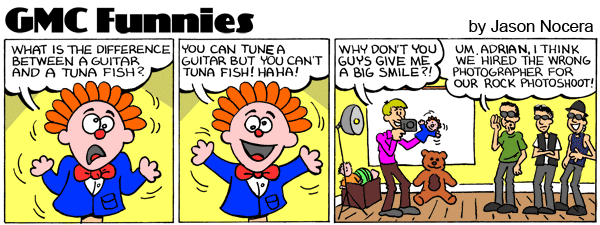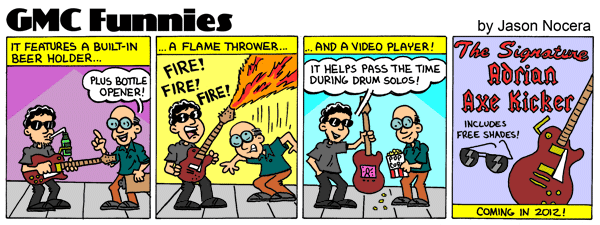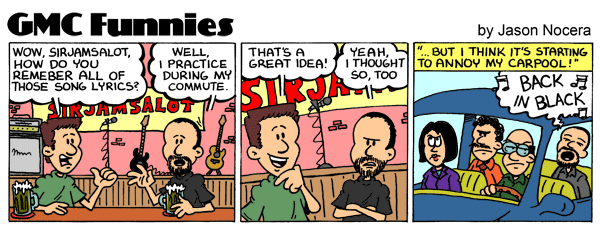Make It Louder, Mixing/Mastering example of making a recording loud |
|
|
|
|
|
| Oct 4 2011, 11:35 AM |
|
Some of you will have read Fireball's thread about how to get the same tone as Messhugah here. In it he also wanted to now how to get his mix louder. Well he very kindly agreed to send me a wave file of his mix so that we could use it as a practical, real example of some of the techniques that a mastering engineer may use to do this.
-------------------------- Notes: 1/the example and explanation here is all about making the mix louder - not about getting a Messhugah type sound. I'm also not going to discuss any mix issues that Fireball and I talked about regarding his track. 2/ There are many people, from home recording/mixing studios through to professional mix engineers, who resort to using a limiter as their main, or in many cases only, technique to make a recording loud and many claim that this is 'mastering' and charge money for it. Contrary to this popular belief and practice, mastering engineers DO NOT rely mainly on putting a limiter on the 2/main bus to make a mix loud because it will butcher the recording. 3/The recorded examples below have been transcoded to mp3s from the original wave audio files. As such they are more compressed than the originals and so loose some dynamic impact but I've done this to save space and time. 4/ The louder version is NOT a master, it was literally done in 5 minutes as a very quick first pass. --------------------------- Here's an edited mp3 version of Fireball's original -  Two_Edged_Sword_thefireball.mp3 ( 762.9K )
Number of downloads: 264
Two_Edged_Sword_thefireball.mp3 ( 762.9K )
Number of downloads: 264Here's the louder version -  The_Fireball_Two_Edged_Sword_Quick_Demo_Master.mp3 ( 827.39K )
Number of downloads: 260
The_Fireball_Two_Edged_Sword_Quick_Demo_Master.mp3 ( 827.39K )
Number of downloads: 260-------------------------- What we did to make it louder... The new version is something in the region of 8dB up on the original - that's an increase of nearly 1.5 times the perceived volume. If you attmpted to get this sort of increase using a limter as you only, or even, main technique the track would be spoilt - it would kill the dynamics and almost certainly drive the track in to excessive distortion. So to get a 8dB gain we need to do other things. In this specific example we: 1/gainstaged with outboard hardware processing - EQs and compressors - set to deliberately exceed the input tolerance of a hardware ADC (a Lavry Blue). Essentially we send a hot signal from the EQ/compressors in to the analogue-digital converter. This hot signal exceeds the 'normal' operating range for digital 0dBFS and so we can achieve a level increase. This is gain staging and it relies on the fact that professional audio equpiment is designed and manufactuered so that the amps can be driven above their normal operating range. It's the same technique as when we used to record using analogue equipment that fed an analogue console to a reel-2-reel tape. Running in to the red brought on analgue saturation and a pleasant, musical distortion rather than an immediate nasty digital one. It's rather like the difference between sending a hot signal to a valve/tube guitar amp and to a transistor amp: first amp goes in to musical valve distortion, the second gets nasty. Note: A professional ADC has been designed so that there it can accept a hot signal: domestic and prosumer ADCs are NOT designed to have this tolerance. If you attempt to clip a domestic/prosumer ADC the hot signal will overload the ADC and you will get nasty digital distortion. So don't try this at home. 2/ EQ - to surgically remove and lower some of the frequency spectrum - mainly the low bass and sub bass. Humans do not hear the extremes of the 0-20kHz frequency spectrum as well as the middle frequencies. For instance, to make a low bass signal sounds as loud as a mid frequency requires a lot of energy. Audio that contains a lot of low bass will not sound as loud as one that doesn't but has a similar spectral energy. Reducing the extreme frequencies allows us to use that energy to increase the mid frequencies and gain and so make the audio seem louder. This form of pass filtering is quite common in mastering but it is specific to the actual track. You can't do this with music that relies on sub bass - dub reggae, dub step, etc - and need to be very careful using it if certain instruments are present - acoustic grand pianos, church organs, double bass, trumpets, triangles, cymbals... How much you filter and from where again depends on the actual track - there are no generalisable settings, you have to listen to the music and make a judgement. In this specific example we pass filtered from @ 35Hz at an attenuation of -6dB/Octave. To aoid taking out too much low end on the kick drum we also added some gain at @90Hz on a very tight Q. This way we could maintain some of the punch of the kick whilst still reducing the bass content generally. We also added a quasi-Baxendall filter to the entire track. This is like a tilted EQ shelf that runs across the entire audible range from 0-22kHz. You set the tilt to either increase the high/decrease the lower frequencies or vice versa. Tilting it one way makes a track darker as you increase the low end/reduce the upper, tilt the other way has the opposite affect. We wanted to make the trak less dark and reduce the bass energy overall. Our mid point was at 750Hz and the 'tilt' was assymetric around this point- we increased the upper end more than we lowered the bass. At 0Hz we had an attenuation of about -.9dB and at 22kHz the gain was about 1.2dB. Also the 'shelf' was a slow 'S' curve rather than a straight lin so that it affected the extremes of the spectrum much more than the centre in a non liear manner. 3/Compression - most mix engineers tend to use compressors at quite high ratios i.e. they really do squash the loud noises. This apparent 'increased' headroom lets them increase the output signal with a result that the track will sound louder but less dynamic. Mastering engineers often use fractional ratios in compression. We couple this with the use of a lower threshold so that the onset of compression starts at a much lower signal and so more of the signal is subject to compression. We thus compress more of the music but to a muh lower degree. It doesn't have such an extreme affect and can sound more natural and be less obvious. It also helps drive up the apparent volume with less increase in the output gain. In this case we used a fractional ratio of 1.2:1 and had a threshold down at about -70dB we also used a fast attack and medium release times. 4/Dynamic EQ - it's common to place an EQ before a compressor and/or use an EQ to trigger a compressor that's on a side chain. However, in sidechaining you can use pretty much any processor to trigger another. Here we wanted to emphasise and add gain to the mid frequency band from @1000Hz. By using a dynamic EQ - where a side chained compressor drives an EQ - we could set it so that we could affect a frequency band only if the signal exceeded a specific dynamic level. So you can add/attenuate EQ for loud/dynamic signals or for quiet ones but without having much affect on the other.What we wanted to do was to drive the mid band but only when it fell below a given dynamic range and without increasing the peak signal. The perceived effect is that the music becomes louder in this frequency range but without the peak signal being affected. We ecntered around 1000Hz as this area helps emphasise the presence of electric guitar. 5/ Limiting - We did use a limiter but we only needed it to add about 1dB of gain and also to set the output at -.3dB to help prevent intersample overs when we transcoded the audio to mp3. ---------------------------------- Conclusion - for an 8dB increase in level less than 1dB was by using a limiter. The vast majority of apparent volume gain is down to gain staging and the use of EQ and compression. -------------------- Get your music professionally mastered by anl AES registered Mastering Engineer. Contact me for Audio Mastering Services and Advice and visit our website www.miromastering.com
Be friends on facebook with us here. We use professional, mastering grade hardware in our mastering studo. Our hardware includes: Cranesong Avocet II Monitor Controller, Dangerous Music Liasion Insert Hardware Router, ATC SCM Pro Monitors, Lavry Black DA11, Prism Orpheus ADC/DAC, Gyratec Gyraf XIV Parallel Passive Mastering EQ, Great River MAQ 2NV Mastering EQ, Kush Clariphonic Parallel EQ Shelf, Maselec MLA-2 Mastering Compressor, API 2500 Mastering Compressor, Eventide Eclipse Reverb/Echo. |
|
|
||
|
|
|
|
| Oct 4 2011, 01:52 PM |
|
Very detailed job Tony, sounds awesome
-------------------- - Ivan's Video Chat Lesson Notes HERE
- Check out my GMC Profile and Lessons - (Please subscribe to my) YouTube Official Channel - Let's be connected through ! Facebook! :) |
|
|
||
|
|
|
|
| Oct 4 2011, 09:58 PM |
|
Excellent tips Tony ,thanks !
|
|
|
||
|
|
|
|
| Oct 4 2011, 11:15 PM |
|
thanks tony!!, that explains a lot of things
when i'm making quick mixes, for a lesson for example (and i mean quick with like 8-10 hours mix), i add a couple of compressors, maybe an eq to the main BUS and then i throw the waves limiter, and it sound great and all but the volume is never dramatically increased, at least if i'm planning to keep SOME of the dynamics. thanks for those tips man, now i need a lot of money on hardware --------------------  Check my Instructor Profile Rockers! Got a Blog too!, www.adriantracks.com Follow me on facebook and youtube! -Youtube   |
|
|
||
|
|
|
|
| Oct 5 2011, 10:18 AM |
|
I've never used a limiter and I don't even know how to use one !
Great info Tony, it's always awe inspiring to see a Master (no pun intended) at their craft ! |
|
|
||
|
|
|
|
| Jan 17 2012, 04:03 PM |
|
So is the goal (in Reaper) not to have any clipping? The master bus shows clipping but I don't hear it. It's the snare that is doing most of this I think. There's a tutorial on youtube that uses a limiter to chop off all those spikes to make it flat - but this is not the best way to do it as you have told me. I don't want to destroy my mix. Just need a little clarification I think. How do other guys do this in software? Part of the goal at mixing in a daw is not to clip the master bus and to be on the safe side that means that you should also not clip individual channels. (Technically on a FP system you can light up individual track lane clip indicators prior to mix down/rendering provided you don't clip the master but it's not a good habit to get in to unless you've got experience and understand your console properly.) If your master bus shows clipping - and assuming that the meter is properly set up - it is clipping. If it's a transient like the snare then listen particularly for distortion on the high frequencies and in quiet places. Also listen for how the dynamic range is dragged in, how the stereo width narrows and how the ghost centre loses focus. It may also have other issues/artifacts as well. If you can't hear the issues it's not because they're not there but because your monitoring chain isn't reproducing it properly. Afraid I don't pay attention to tutorials etc on FB or youtube and I don't know the one you're refering to Brandon. Have to say though that many of them are 'interesting'. My advice is if you intend to do any more processing or have the track mastered then you should not put a limiter on the master bus. There are many ways to control levels and get volume both at mixing and at mastering before you have to resort to limiting. Personally I'd go further and say that generally you should not need a limiter at mixing provided you have balanced the mix properly. Mixing engineers who resort to using a limiter often do so either due to their inexperience and/or a desire to attempt to provide a 'master' for their clients (and so get paid more). The best and most experienced professinal mixing engineers I work with and have expeerience of never attempt to do this. -------------------- Get your music professionally mastered by anl AES registered Mastering Engineer. Contact me for Audio Mastering Services and Advice and visit our website www.miromastering.com
Be friends on facebook with us here. We use professional, mastering grade hardware in our mastering studo. Our hardware includes: Cranesong Avocet II Monitor Controller, Dangerous Music Liasion Insert Hardware Router, ATC SCM Pro Monitors, Lavry Black DA11, Prism Orpheus ADC/DAC, Gyratec Gyraf XIV Parallel Passive Mastering EQ, Great River MAQ 2NV Mastering EQ, Kush Clariphonic Parallel EQ Shelf, Maselec MLA-2 Mastering Compressor, API 2500 Mastering Compressor, Eventide Eclipse Reverb/Echo. |
|
|
||
|
|
|
|
| Jan 17 2012, 07:48 PM |
|
wow. just wow.
Great info. Thanks! -------------------- The more I practice, the more I wish I had time to practice!
My Band Forum: http://passionfly.site/chat  |
|
|
||
|
|
|
|
| Jan 17 2012, 07:51 PM |
|
Part of the goal at mixing in a daw is not to clip the master bus and to be on the safe side that means that you should also not clip individual channels. (Technically on a FP system you can light up individual track lane clip indicators prior to mix down/rendering provided you don't clip the master but it's not a good habit to get in to unless you've got experience and understand your console properly.) If your master bus shows clipping - and assuming that the meter is properly set up - it is clipping. If it's a transient like the snare then listen particularly for distortion on the high frequencies and in quiet places. Also listen for how the dynamic range is dragged in, how the stereo width narrows and how the ghost centre loses focus. It may also have other issues/artifacts as well. If you can't hear the issues it's not because they're not there but because your monitoring chain isn't reproducing it properly. Afraid I don't pay attention to tutorials etc on FB or youtube and I don't know the one you're refering to Brandon. Have to say though that many of them are 'interesting'. My advice is if you intend to do any more processing or have the track mastered then you should not put a limiter on the master bus. There are many ways to control levels and get volume both at mixing and at mastering before you have to resort to limiting. Personally I'd go further and say that generally you should not need a limiter at mixing provided you have balanced the mix properly. Mixing engineers who resort to using a limiter often do so either due to their inexperience and/or a desire to attempt to provide a 'master' for their clients (and so get paid more). The best and most experienced professinal mixing engineers I work with and have expeerience of never attempt to do this. Awesome reply Tony. Very informative. This is the tutorial I was speaking of in case you are interested. |
|
|
||
|
|
|
|
| Jan 18 2012, 11:27 AM |
|
... This is the tutorial I was speaking of in case you are interested. Thanks Brandon. I took a look ... well I guess if ysomeone is just doing a 'bedroom master' and doesn't intend to sell/release stuff you could do this. It won't be great though. TBH their mix itself needs sorting before it is mastered (bedroom or properly) - I can hear problems with it even on this laptop. Sad that they started with clipped audio, sad that they didn't sort out that and the levels first, dissappointing that they don't seem to know what soft and hard knee control is for. As Todd says the end result just ain't going to be stella - it will just be louder and have even more probems the way they're doing it. I could go on but... More seriousy though the Internet is full of people who claim to be able to record, mix and master but who don't seem to know the basics. That people like that charge to record/mix/master -------------------- Get your music professionally mastered by anl AES registered Mastering Engineer. Contact me for Audio Mastering Services and Advice and visit our website www.miromastering.com
Be friends on facebook with us here. We use professional, mastering grade hardware in our mastering studo. Our hardware includes: Cranesong Avocet II Monitor Controller, Dangerous Music Liasion Insert Hardware Router, ATC SCM Pro Monitors, Lavry Black DA11, Prism Orpheus ADC/DAC, Gyratec Gyraf XIV Parallel Passive Mastering EQ, Great River MAQ 2NV Mastering EQ, Kush Clariphonic Parallel EQ Shelf, Maselec MLA-2 Mastering Compressor, API 2500 Mastering Compressor, Eventide Eclipse Reverb/Echo. |
|
|
||
|
|
|
|
| Mar 1 2012, 01:46 AM |
|
There's a guy on soundcloud who told me I could make my track louder by putting a compressor on the bus, and enable Limit Output. Indeed, the track does get louder as I raise the Wet slider, but I can hear audible nasty distortion - just like Tony says.
Mastering seems to be the part where you get your volume. I think I can handle the mixing so so. I'm just starting out. So the question is... Who do I get to master my tracks I will be releasing over the internet? I want my volumes to compete with everybody else's, but I wanna do it the right way...and not the half-crap way. Is WideK any good? He offers mastering services. I'm not trained, so I don't know if my ears are to be trusted. His stuff sounds good to me, but I dunno...I'm no pro. Tony? |
|
|
||
|
|
|
|
| Mar 1 2012, 11:52 AM |
|
... So the question is... Who do I get to master my tracks I will be releasing over the internet? IMO you should use a proper mastering engineer. Mastering isn't just about making things commercially loud, its more about ensuring that your music is fit for purpose and sounds as good as it can. Anything that you put up on the internet can potentially be seen and heard by a huge international audience and you only get one chance to make the right impression. QUOTE I want my volumes to compete with everybody else's, but I wanna do it the right way...and not the half-crap way. Is WideK any good? He offers mastering services. I'm not trained, so I don't know if my ears are to be trusted. His stuff sounds good to me, but I dunno...I'm no pro. Tony? The problem with sites like this is that his before and after samples don't demonstrate much. Just two points - though there are more: 1/You don't know what the client wanted. 2/The before and after samples are not volume matched so the 'mastered' version will almost certainly sound better as an effect of the equal loudness contours. Anyway back to your question. Would I use him if I wanted stuff mastered? Well: His internet site is very generic and he doesn't provide proper contact details, prices and so on. He doesn't provide a list of equipment. So what is he using as a mastering engineer to master stuff? Is it all ITB vst plugins or hardware or both? Does he actually use the equipment or is he relying on presets? He provides mixing services as well. So is he mixing and mastering in the same room and on the same equipment? If so then is the room acoustically treated for mixing or for mastering? If not why doesn't he say he's a multi-room studio? What is his monitoring chain? Is it really a mastering level one or is it more home/project mixing studio? He doesn't tell you what his background and experience is. How many years has he done this? Is he registered and approved by the AES? What real commercial experience has he; I don't mean the very small number of indie releases he names but what professional,major jobs has he done. Has his work won any awards? He doesn't actually detail what he thinks mastering is and his examples do little other than increase the loudness. Does he know the redbook and other colourbook standard? Does he know how and why mastering for vinyl differs from digital? Does he know how to gainstage? Does he know and can he embedded ISRC in to an mp3? Etc., etc., etc. Again I could go on a lot more but you get the idea... I'm not going to state our prices - anyone who wants to know can pm me or look at our internet site - but professional mastering isn't as expensive as most people think. With a professional mastering engineer you pay for: the experience; that the ME is a specialist; has a properly set up mastering studio; uses mastering grade hardware and software; knows the technical standards; and so on. Now I don't know how much this guy charges but you get what you pay for... -------------------- Get your music professionally mastered by anl AES registered Mastering Engineer. Contact me for Audio Mastering Services and Advice and visit our website www.miromastering.com
Be friends on facebook with us here. We use professional, mastering grade hardware in our mastering studo. Our hardware includes: Cranesong Avocet II Monitor Controller, Dangerous Music Liasion Insert Hardware Router, ATC SCM Pro Monitors, Lavry Black DA11, Prism Orpheus ADC/DAC, Gyratec Gyraf XIV Parallel Passive Mastering EQ, Great River MAQ 2NV Mastering EQ, Kush Clariphonic Parallel EQ Shelf, Maselec MLA-2 Mastering Compressor, API 2500 Mastering Compressor, Eventide Eclipse Reverb/Echo. |
|
|
||
|
|
|
|
| Mar 2 2012, 01:51 PM |
|
Okay, Tony - I see now what you mean. If he is not going to be professional and state all this info, then he probably doesn't have the necessary experience/hardware/setup/etc. I will most certainly look into professional mastering - and probably mixing. Just a suggestion - experiment with your own mix but also talk to the ME and the mix engineer and see what they do to your recording. Then compare what you did and what they do and consider how and why there are similarities and differences. -------------------- Get your music professionally mastered by anl AES registered Mastering Engineer. Contact me for Audio Mastering Services and Advice and visit our website www.miromastering.com
Be friends on facebook with us here. We use professional, mastering grade hardware in our mastering studo. Our hardware includes: Cranesong Avocet II Monitor Controller, Dangerous Music Liasion Insert Hardware Router, ATC SCM Pro Monitors, Lavry Black DA11, Prism Orpheus ADC/DAC, Gyratec Gyraf XIV Parallel Passive Mastering EQ, Great River MAQ 2NV Mastering EQ, Kush Clariphonic Parallel EQ Shelf, Maselec MLA-2 Mastering Compressor, API 2500 Mastering Compressor, Eventide Eclipse Reverb/Echo. |
|
|
||
1 User(s) are reading this topic (1 Guests and 0 Anonymous Users)
0 Members:





























